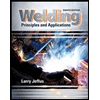
EBK 3I-EBK: WELDING PRINCIPLES & APPLIC
8th Edition
ISBN: 9780176919764
Author: Jeffus
Publisher: VST
expand_more
expand_more
format_list_bulleted
Concept explainers
Textbook Question
Chapter 12, Problem 29R
What happens to water in the welding arc?
Expert Solution & Answer
Want to see the full answer?
Check out a sample textbook solution
Students have asked these similar questions
Only question 3
Only question 2
Solve for the support reactions at A and B.
C
3 kN/m
B
-1.5 m-
-1.5 m 1.5 m-
1.5 m-
Chapter 12 Solutions
EBK 3I-EBK: WELDING PRINCIPLES & APPLIC
Ch. 12 - List some factors that have led to the increased...Ch. 12 - How is FCAW similar to GMAW?Ch. 12 - What does the FCA flux provide to the weld?Ch. 12 - What are the major atmospheric contaminations of...Ch. 12 - How does slag help an FCA weld?Ch. 12 - How can FCA welding guns be cooled?Ch. 12 - Excessive drive roller pressure causes what...Ch. 12 - List the advantages that FCA welding offers the...Ch. 12 - Describe the two methods of manufacturing FCA...Ch. 12 - Why are the large diameter electrodes not used for...
Ch. 12 - How do deoxidizers remove oxygen from the weld...Ch. 12 - What do fluxing agents do for a weld?Ch. 12 - Why are alloying elements added to the flux?Ch. 12 - How does the flux form a shielding gas to protect...Ch. 12 - What are the main limitations of the rutile...Ch. 12 - Why is it more difficult to use lime-based fluxed...Ch. 12 - What benefit does adding an externally supplied...Ch. 12 - How do excessive amounts of manganese affect a...Ch. 12 - Why are elements added that cause ferrite to form...Ch. 12 - Why must a flux form a less dense slag?Ch. 12 - Referring to Table 12-5, what is the AWS...Ch. 12 - Describe the meaning of each part of the following...Ch. 12 - What does the number 316 in E316T-1 mean?Ch. 12 - What is the advantage of using an argon- CO2 mixed...Ch. 12 - Why are some slags called refractory?Ch. 12 - What can happen to slag that solidifies on the...Ch. 12 - How is the electrode extension measured?Ch. 12 - What can cause porosity in an FCA weld?Ch. 12 - What happens to water in the welding arc?Ch. 12 - What is the thin dark gray or black layer on new...Ch. 12 - Why is uniformly scattered porosity hard to detect...Ch. 12 - What cautions must be taken when chemically...
Knowledge Booster
Learn more about
Need a deep-dive on the concept behind this application? Look no further. Learn more about this topic, mechanical-engineering and related others by exploring similar questions and additional content below.Similar questions
- 4. Solve for the support reactions at A and B. W1 600 lb/ft W2 150 lb/ft A Barrow_forwardIn cold isostatic pressing, the mold is most typically made of which one of the following: thermosetting polymer tool steel sheet metal textile rubberarrow_forwardThe coefficient of friction between the part and the tool in cold working tends to be: lower higher no different relative to its value in hot workingarrow_forward
- The force F={25i−45j+15k}F={25i−45j+15k} lblb acts at the end A of the pipe assembly shown in (Figure 1). Determine the magnitude of the component F1 which acts along the member AB. Determine the magnitude of the component F2 which acts perpendicular to the AB.arrow_forwardHi can you please help me with the attached question?arrow_forwardHi can you please help me with the attached question?arrow_forward
arrow_back_ios
SEE MORE QUESTIONS
arrow_forward_ios
Recommended textbooks for you
 Welding: Principles and Applications (MindTap Cou...Mechanical EngineeringISBN:9781305494695Author:Larry JeffusPublisher:Cengage Learning
Welding: Principles and Applications (MindTap Cou...Mechanical EngineeringISBN:9781305494695Author:Larry JeffusPublisher:Cengage Learning

Welding: Principles and Applications (MindTap Cou...
Mechanical Engineering
ISBN:9781305494695
Author:Larry Jeffus
Publisher:Cengage Learning
Metal Joining Process-Welding, Brazing and Soldering; Author: Toc H Kochi;https://www.youtube.com/watch?v=PPT5_fDSzGY;License: Standard YouTube License, CC-BY